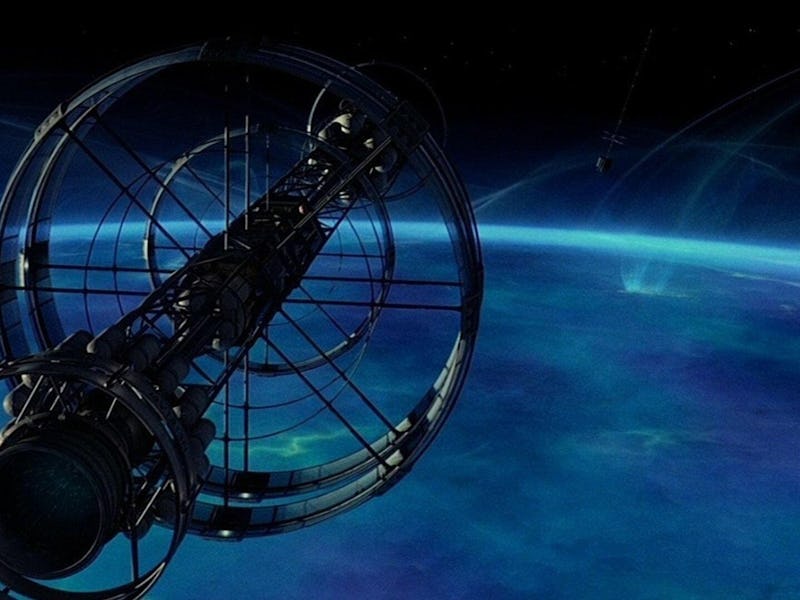You need to watch the most underrated sci-fi remake on HBO Max before it leaves this week
Considered too artsy for most and inferior to the original by genre nerds, this slow and cerebral redo is worth another look.

During the Nazi occupation of Poland, Polish sci-fi author Stanislaw Lem was forced to reckon with a difficult fact: He was Jewish. As he later explained in The New Yorker, before the occupation he had only the loosest understanding of Jewish religion and culture. The irony of the invasion for Lem was that “it was, strictly speaking, only the Nazi legislation that brought home to me the realization that I had Jewish blood in my veins.”
Only 18 at the beginning of the occupation, Lem’s family was able to escape with false identification papers. The harrowing experience would play into Lem’s now-famed science fiction. While Lem didn’t write directly about the Holocaust, he used sci-fi to wrestle with questions of human identity pushed to their absolute extreme. For many of Lem’s characters, it’s only through recognizing the inhuman nature of alien life that they begin to understand their humanity.
That’s the case in his 1961 novel Solaris, which has been adapted to the screen three times. First there was a Soviet TV play, then Soviet director Andrei Tarkovsky made his acclaimed 1972 version. And then Steven Soderbergh made an adaptation in 2002 starring George Clooney, which flopped at the box office despite the promise of seeing Clooney’s ass.
"It's a tough movie to sell," Clooney said at the time. "They're spinning their wheels on this one. I think they're happy for anything that can get them some ink, and I suspect that is why you've heard so much about my butt."
Solaris is about psychologist Dr. Chris Kelvin (Clooney), who’s approached by agents of a space-mining corporation called DBA. DBA employs a friend of Kelvin’s, Gibarian (Ulrich Tukur), who makes an odd request via pre-recorded video message: Chris needs to come visit him on the space station which orbits the planet Solaris.
He’s having trouble explaining why, which is why Chris needs to get up there. It will be easy, his DBA handlers assure him.
Solaris was a change of pace for both Clooney and Soderbergh, and marketing struggled to move beyond “Come see George’s butt.”
What Kelvin finds upon arrival shocks him. Gibarian has killed himself. In fact, most of the crew has died bloody deaths. The two survivors, Snow (Jeremy Davies) and Dr. Gordon (Viola Davis), don’t offer much help. Snow talks in spurts and generalities, while Gordon refuses to leave her room.
The two don’t tell Kelvin what’s going on, but say he’ll understand when it happens to him. And soon enough, it does. He starts having dreams of his ex-wife Rheya (Natascha McElhone). Rheya died several years ago, but when he wakes up there she is, plain as day. Horrified, he leads this new Rheya to an escape pod and jettisons it into the void. Conferring with Snow, he comes to understand that dead people close to the team are manifesting themselves on the station.
And they keep coming. Rheya appears again, both her own person and the same Rheya Chris once knew. She’s been created out of his memories, unable to understand herself or why she’s there. These people — although Dr. Gordon deny that they’re people at all — have been created by Solaris, although how and why are a mystery.
In Lem’s novel, Solaris is a living ocean whose actions befuddle scientists. Neither Tarkovsky or Soderbergh spent much time on the scientific aspects of the story, which frustrated the author. In a 2002 letter addressing both movies (although he’d only read reviews of Soderbergh’s), Lem says he’d wanted to “create a vision of a human encounter with something that certainly exists, in a mighty manner perhaps, but cannot be reduced to human concepts, ideas or images. This is why the book was entitled Solaris and not Love in Outer Space.”
Maybe that title would have helped the box office, as Clooney and McElhone bring everything they’ve got to this strange romance.
But Soderbergh, who’s never been comfortable making the full leap into sci-fi, sticks to a compelling story. While his planet Solaris is gorgeous, throbbing with purple and blue electricity, its mysteries are not probed. Soderbergh wants to stay with Chris and Rheya, exploring their relationship from its promising and warm beginning to a bitter end which the two now seem to be repeating over and over again.
Solaris is a movie that’s happy to play with ambiguity. It's not quite a thriller, it’s not quite a love story, and it’s sci-fi only in a structural sense. Roger Ebert called Solaris “the kind of smart film that has people arguing about it on their way out of the theater,” which felt similar to Marc Maron’s more recent request for movies “where we can all sit together and not understand the ending.”
Solaris delivers on both. The movie itself was overshadowed by another collaboration between Soderbergh and Clooney, Ocean’s Eleven, which is the opposite of Solaris in every possible way. But Solaris shows them at their most curious, eager to explore what can’t be defined.
Solaris is streaming on HBO Max until June 30.